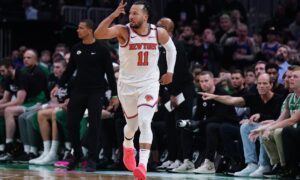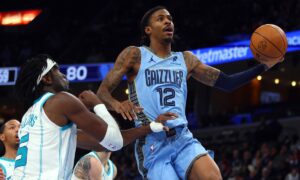The National Basketball Association (NBA) is one of the most popular professional sports leagues worldwide— but it was not always that way.
Players such as Magic Johnson and Larry Bird took the league to a new level with their legendary rivalry in the 70s, 80s and 90s, building upon the work that Julius Erving and plenty of others did before and setting the stage for Michael Jordan to come in and globalize the sport with his jaw-dropping theatrics.
However, as much of an impact as the older generations made, the game has changed dramatically since the turn of the century; here are the players most responsible for these changes.
Allen Iverson
Iverson brought a new aura into the NBA, whether that be from his tight cornrows, his oversized clothing, his casual press conference attire, his realistic approach to life, or his flashy on-court style. At just 5-foot-11, 165 pounds, Iverson was the focus of posters in young fans’ bedrooms all over America and captivated audiences with his logic-defying athleticism and unmatched skill. He finished his NBA career with an MVP and a run to the Finals, cementing himself as a paradigm shifter in the league.
LeBron James
LeBron has left his impact on the league primarily with how he empowered himself and other players to a degree that nobody had even considered before. A lot of this stemmed from “the decision,” during which he took out a spot on national television to announce where he would be signing in free agency— after that, he recruited Chris Bosh to join him and Dwyane Wade in South Beach and began growing his business empire, leading him to the point he is at today as one of the most influential businessmen in America despite still being in his first career. LeBron also revolutionized the way players approach their bodies and redefined what is possible from aging veterans after scoring over 30 points per game in his 19th season, more than doubling Kareem Abdul-Jabbar’s next-highest total for the same season.
Stephen Curry
There is a legitimate argument that Steph changed the game more than any player in league history; nowadays, every player wants to chuck up threes, regardless of what position they play, and sometimes, the situation that they are in. Two-on-one fastbreaks are no longer simple streaks to the hoop and a decision whether to finish or dump the ball to a teammate, they have become stop-and-pop threes if the defender is favoring the player’s teammate, or the opposite, where the driver will beeline for the rim before kicking it out to a peeling teammate that is waiting beyond the arc. Curry also inspired statheads to construct teams focused on threes and frees, which led to the creation of teams that looked unlike anything seen before.
Kobe Bryant
Kobe left his mark on the league for two distinct reasons: first, he was clutch in every sense of the word, and second, he was relentless. The “Black Mamba” once applauded Dwyane Wade’s intensity after he broke his nose in an All-Star Game, much to the surprise of Wade, who expected Bryant to be furious after getting injured in an exhibition event. Kobe would shoot any time from anywhere, but more times than not, the entire stadium thought that shot was going to fall, leading to kids everywhere shouting “KOBE!” whenever they would throw objects into a trash can.
Dirk Nowitzki
Nowitzki broke the international barrier in the NBA, not in the sense that he was the first foreign player to come or find success, but he was the first European player to take home the league’s most prestigious individual award, the MVP, and was the paramount example of a stretch five. Nowitzki, standing seven feet tall, had a buttery-smooth jump shot, the best fade-away ever, and was a 2006 three-point shootout champion.
In an era where a lot of centers lack aggression and multi-level scoring ability and prefer to camp the perimeter, Nowitzki could bring his defenders outside or go to work on the block regardless of who was defending him.









